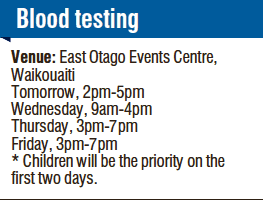
The food will be provided by the Dunedin City Council this week from tomorrow at the East Otago Events Centre in Waikouaiti, which is also where free blood tests to assess lead levels will be carried out.
The blood tests at the centre from tomorrow are expected to help officials establish whether residents from Waikouaiti, Karitane and Hawksbury north of Dunedin have been chronically exposed to lead in their drinking water.
Sampling of the water has revealed intermittent or one-off spikes in lead levels in recent months, and an elevated reading at the Waikouaiti raw water reservoir last month prompted officials to advise residents not to drink from tap water since last Tuesday.
About 500 people from the affected towns attended a public meeting on Friday night and one question that came up was whether it was safe to eat vegetables from gardens irrigated with local water.
Officials were unable to say, but recommended people hold off on harvesting or eating produce from their gardens until more was known.
Yesterday, Dunedin City Council chief executive Sandy Graham said Kaan’s Catering Supplies would deliver a range of fruit and vegetables.
"This is a very worrying time for residents in these communities and it’s important we do what we can to help at a practical level while we continue working towards finding the cause of the contamination," she said.
The fruit and vegetables could be collected during the times the centre was open for blood testing, she said.
The council asked people to bring their own bags.

Water tankers continue to be used to make sure people have access to clean, safe drinking water.
The way in which the council and health authorities have handled the saga has been under intense scrutiny in the past week, including the lack of a public warning until this month.
Lead is a cumulative toxin and long-term exposure can cause symptoms such as developmental delays or memory impairment.
The source, or sources, of contamination of the water supplies north of Dunedin remains unclear.
Some contamination may be due to lead joins in older pipes, but there could be environmental contamination at the water source or sampling errors.
The council has emphasised the problem appears to have been intermittent and it has increased the frequency of water sampling.
Work to dig up and check the condition of some sections of old cast-iron water pipes in Waikouaiti is almost complete.

The Otago Regional Council expects to receive test results from the Waikouaiti River this week and Waikouaiti Coast Community Board chairman Alasdair Morrison said soil testing would be undertaken.
Waikouaiti resident Michelle Cox attended Friday’s meeting and said the city council’s offer of free fruit and vegetables was a kind gesture.
She was putting her own organic produce in the freezer in the hope it could be salvaged.
Mrs Cox planned to bring her family to the events centre this week for blood tests and to receive fruit and vegetables.
Dunedin Mayor Aaron Hawkins said many people relied on their gardens and providing the food was a practical way to help in an uncertain time.
The anxiety evident at Friday’s meeting was understandable, he said.
Mr Morrison said the meeting was constructive.
Many people would have arrived angry and still left upset, but with more knowledge, he said.
A second public meeting is expected to be held in about two weeks’ time. By that time, results from blood tests should be known.












